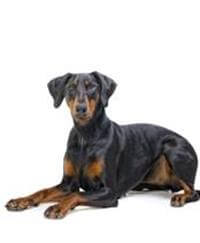Find products that match your dog’s needs

A Dobermann’s sharp and sleek features are quick to let anyone know that they truly are dogkind’s noblemen. Originally bred for tax collectors’ protection, these dogs have been one of the most well-known worker dogs in the world. While Dobermanns make for excellent watchdogs, they are also known for being loyal, loving, and caring towards their caregivers. For those wondering if the Dobermann dog breed is suitable for families, they are indeed excellent, especially due to their loving and loyal nature.
If you plan on bringing a Dobermann home, all you need to be sure of is giving it the time and attention it needs. These dogs are athletic and need to stick to a routine. They also need a lot of attention and positive reinforcement. If you and/or your family can make these commitments, there’s nothing standing in the way of you raising one of the world’s best dog breeds.
Here are some Dobermann characteristics that you should keep in mind before bringing one home:
Weight | 27 to 46 kg |
Height | 24 to 28 inches |
Lifespan | 10 to 12 years |
Coat | Single coat |
Dobies were bred for protection and their short, yet soft coat always makes it look like they’re in uniform. Their lean bodies have splashes of brown over their ears, muzzles, legs, and feet while the rest is covered in a solid colour. Here are some colours you can find the Dobermann dog breed in:
Yes, reading the colour “white” in the list above may have taken you by surprise. That is because the rarest and the most unique coat colour ever found on a Dobermann dog is white.
Dobermanns, in rare cases, can be mistaken for the Beauceron dog breed because of their similar physique and coat colours. If you want to ensure that you are bringing a purebred Dobermann dog home, look out for these physical characteristics:
Dobermanns are loyal, courageous, and intelligent. However, pet parents need to be extremely patient, keeping this breed’s history as watchdogs in mind. Unlike most dog breeds, this Dobermanns are not for everyone. So, if you are planning on bringing one home, it’s best you do your own research.
Since Dobermanns are active and athletic in nature, they need a consistent schedule and lots of positive reinforcement from their caregivers. Hence, if you want to shelter a Dobe, make sure you can be committed to following a routine and giving it a lot of attention each day. These family dogs are always on their guard and with good training, they can also learn a few complicated tasks.
Dobermanns also get along very well with other pets, provided they have been socialised at a young age. While this breed may look aloof and reserved, they love their chosen family and expect a lot of affection from them. They can also not be left alone for a long time since they can develop separation anxiety. Dobermanns are family dogs who are also referred to as “velcro dogs”, because they always want to be around their family.
Yes, Dobermanns need to start their training at a young age to ensure that they do not become an aggressive menace. A Dobermann can be extremely aggressive if it is not trained from an early stage.
You can attempt to train your Dobermann dog at home, where it establishes you as the pack leader. However, if you are unable to give it the time and attention it needs as a pup, especially with respect to training, you should enrol it in a kennel. Dogs generally don’t feel comfortable in kennels, until they are properly settled in. However, that shouldn’t stop you from providing your pooch with kennel training. This training can shape their behaviour and personality, which is crucial in the longer run. Moreover, once your Dobe is all settled in, it will be his favourite place to be. So, make sure you choose a kennel with excellent training programs.
Are you all set to bring a Dobermann home? Here’s how you can take care of this dog breed:
Dobermanns are known to be healthy dogs, but they are prone to certain diseases. One of the most life-threatening medical issues that this breed faces is “bloat”. It is a serious digestive condition where the dog’s stomach fills with some fluid, food, or gas and swells up. Other diseases like hip dysplasia, Von Willebrand's disease, progressive retinal atrophy, dilated cardiomyopathy, hypothyroidism, and albinism can also affect Dobermanns. Hence, pet parents must always watch out for symptoms of poor health in dogs to spot any illness at an early stage.
One of the best things about the Dobermann dog breed is that they were bred to be low-maintenance dogs, especially regarding their fur. Since they have a single coat of short fur, caregivers do not need to worry too much about maintenance. Grooming can be done only when absolutely necessary, depending on the dog’s odour. However, if they have been playing outside in the dirt a lot, it is best to bathe them frequently.
Brush their fur once a month with a soft-bristled brush. Brushing their teeth every alternate day is recommended to keep the germs and bad breath away. Their nails, however, need special attention. Make sure to trim their nails at least once every month.
Dobermanns love being outdoors. If you are fond of hikes, treks, daily jogs, and other outdoor activities, this breed is the best companion to have. They were bred to be watch dogs and military dogs; hence, being active is in their nature. Physical activity is also important to maintain a Dobermann’s mental health. So, take your tall furry friend along for your escapades and have a truly brilliant bonding time. Moreover, these dogs are extremely intelligent; thus, training them should not be a difficult task. So, provide them with sufficient exercise, mental and physical, to blow off steam.
Dobermanns are medium-large breed dogs, and they need high-quality dog food throughout their life. In fact, investing in a dog food that helps you meet your Dobe’s daily nutritional quota is a must. There are no set meal portions for the Dobermann dog breed. It all depends on the amount of physical activity they indulge in every day and their build. Hence, consult a vet to understand the nutritional needs of this breed. They can recommend a nutrient-rich diet for your floof based on factors like weight, age, and overall health.
It all started with the invention of money. And with this invention, one thing was certain – tax collectors were not welcome. During the 19th century, tax collector visits were hostile in Germany. Aware of the situation, dog breeder and taxman, Louis Dobermann, from the town of Apolda was motivated to breed a dependable protector. Dobermanns were soon referred to as the “Tax Collector’s Dog” and quickly gained a reputation for it. Since then, Dobermanns have been police dogs, military dogs, service dogs, family dogs, and therapy dogs. They also excel as show dogs.
Yes, Dobermanns are very much capable of getting along with other pets provided they have been socialised since a young age.
A Dobermann is an excellent family dog. As Dobermanns are watch dogs, they provide unmatched protection. They are also sensitive towards children and extremely devoted to their families.
While a few hours may not hurt, Dobermanns do not do well away from their families. They may suffer through separation anxiety if left alone for too long.
Dobermanns require very little maintenance. Since their fur is single coated and short, they do not need to be brushed or bathed frequently. However, brushing their teeth and trimming their nails once in a while is necessary. Ear care is also highly recommended to keep infections at bay.
Dobermanns do not bark a lot, but they will also not hesitate from doing so when it comes to protecting their family. They are known to be vigilant, which means, your Dobe will bark if it notices anything unusual.

Find a PEDIGREE® stockist
near you!
Buy online
Click to buy from any of the retailers below

